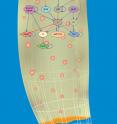Artificial intelligence discovers planarian regeneration model
An artificial intelligence system has for the first time reverse-engineered the regeneration mechanism of planaria--the small worms whose extraordinary power to regrow body parts has made them a research model in human regenerative medicine. The discovery by Tufts University biologists presents the first model of regeneration discovered by a non-human intelligence and the first comprehensive model of planarian regeneration, which had eluded human scientists for over 100 years. The work, published in PLOS Computational Biology, demonstrates how "robot science" can help human scientists in the future.
To mine the fast-growing mountain of published experimental data in regeneration and developmental biology Lobo and Levin developed an algorithm that would use evolutionary computation to produce regulatory networks able to "evolve" to accurately predict the results of published laboratory experiments that the researchers entered into a database.
"Our goal was to identify a regulatory network that could be executed in every cell in a virtual worm so that the head-tail patterning outcomes of simulated experiments would match the published data," Lobo said.
The paper represents a successful application of the growing field of "robot science" - which Levin says can help human researchers by doing much more than crunch enormous datasets quickly.
"While the artificial intelligence in this project did have to do a whole lot of computations, the outcome is a theory of what the worm is doing, and coming up with theories of what's going on in nature is pretty much the most creative, intuitive aspect of the scientist's job," Levin said. "One of the most remarkable aspects of the project was that the model it found was not a hopelessly-tangled network that no human could actually understand, but a reasonably simple model that people can readily comprehend. All this suggests to me that artificial intelligence can help with every aspect of science, not only data mining but also inference of meaning of the data."
Source: PLOS
Articles on the same topic
- Planarian regeneration model discovered by artificial intelligenceFri, 5 Jun 2015, 15:35:20 UTC
Other sources
- Look Out, Scientists! AI Solves 100-Year-Old Regeneration Puzzlefrom Live ScienceFri, 5 Jun 2015, 15:30:24 UTC
- Planarian regeneration model discovered by artificial intelligencefrom Science DailyThu, 4 Jun 2015, 22:30:12 UTC
- Planarian Regeneration Model Discovered by Artificial Intelligencefrom Newswise - ScinewsThu, 4 Jun 2015, 18:30:35 UTC
- Planarian regeneration model discovered by artificial intelligencefrom PhysorgThu, 4 Jun 2015, 18:20:14 UTC
